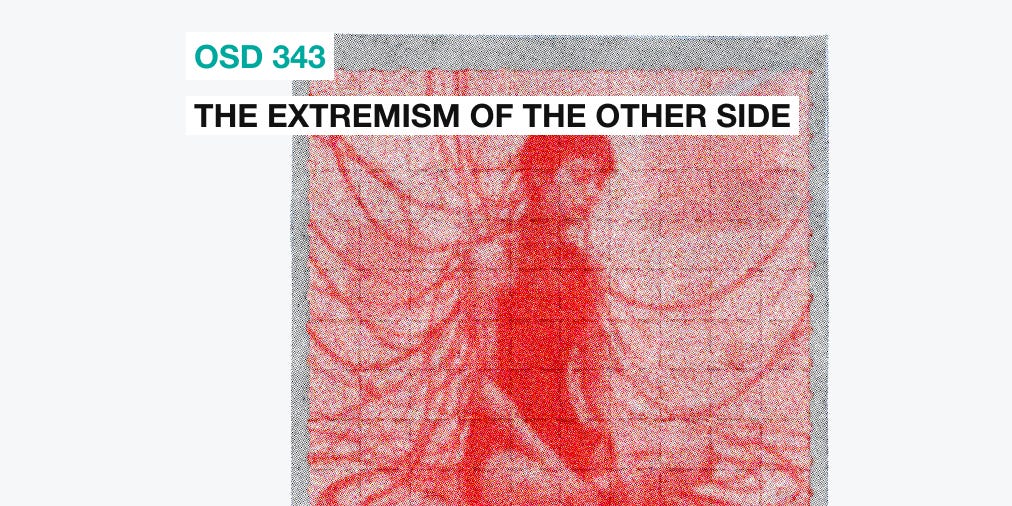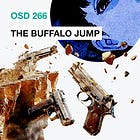OSD 343: The extremism of the other side
There’s an old joke that goes like this:
A traveling salesman was driving along a lonely country road late at night when suddenly — thump! — his car lurched. He pulled over and saw that one of his tires was flat.
He popped the trunk: no jack. He checked under the seats. Nothing. He sighed. “Well, that’s just great.”
Looking around, he noticed a faint glow from a farmhouse about a mile away. “I’ll just walk over and borrow a jack,” he thought. “People out here are friendly.”
So he set out down the road toward the farmhouse. At first, he felt optimistic. But as he trudged along in the dark, doubts crept in.
“It’s awfully late. The farmer might be in bed.”
“He might be annoyed to be woken up.”
“People don’t move to the country to have a stranger knock on their door in the middle of the night.”
His pace quickened, and his thoughts soured. The road was muddy and he was climbing in and out of ditches.
“What if he slams the door in my face?”
“What if he thinks I’m some drifter trying to scam him?”
“Knowing my luck, he’ll laugh at me and tell me to get lost.”
Now he was muttering out loud, climbing through the damn briars on this stupid farm to get to the farmhouse.
“He’ll probably make some smartass comment. ‘I guess you city folks don’t come prepared when you drive into the country.’ It’s not my fault the roads are garbage out here. As if I want to be out here dealing with this! That’s how you treat someone who needs help?”
By the time he reached the farmhouse, the salesman’s blood was boiling. He stomped up the steps and pounded on the door.
The door creaked open. A kind-faced farmer, lamp in hand, blinked at him and said, “Good evening, stranger. What can I do for you?”
The salesman exploded, “You can take your jack and shove it!”
There are a few categories of reaction to the assassination of Charlie Kirk. In no particular order:
“We are under attack.” This is people for whom Kirk was a major cultural figure for good. A guy who started a conservative youth group as a passion project in his teens, against all odds grew it into a cultural juggernaut that shaped the path of American politics, and became one of the most influential voices in the ear of both the public and the president. And at the height of his power, he was gruesomely cut down by political forces that have gone unchecked for too long.
“He had it coming.” This is people who genuinely approve of Kirk’s murder. A tiny percentage, but the internet is a big place, so a tiny percentage of a big denominator is still something.
“Poor guy, how terrible.” This is people who were aware of Kirk as a famous pundit and political figure, and may or may not have feelings about him one way or another. They acknowledge the assassination as a terrible thing but don’t feel it viscerally.
“I disagreed with him on pretty much everything, but his murder is inexcusable.” This is most commentators who weren’t politically aligned with him.
“Who is Charlie Kirk?” This is most people.
It is noteworthy that #3-5 cover the vast majority of people, but if you read X or watch the news, the coverage is mostly about #1 and #2.
This is a familiar dynamic for anybody who follows gun stuff. It’s simple: your side is normal and the other side is extremists. Normalizing what you like and stigmatizing what you don’t like is the core of the haram-to-halal theory. So the incentive structure rewards you for signal-boosting the other side’s most stupid, incendiary extremists. And it rewards them for signal-boosting yours.
If those outliers are the majority of your information about the other side, then it will naturally seem that they are not outliers, and that they’re in fact representative. This feeds on itself. Some people take this at face value, and the extremes among that population end up doing things like assassinating Charlie Kirk. You can model perpetrators like that as basically losers who aren’t in on the bit. Everyone talks shit online, and there’s a gamification to painting the other side in extremes. Most people understand that while there’s a serious political/cultural layer to it, there’s also a fun online shit-talking/point-scoring dynamic too. The ultimate losers take the first part way too seriously, forget altogether about the second part, and kill people over it.
This isn’t to say that extremists don’t exist. They obviously do. Whether they’re murdering someone, censoring speech, getting people fired over culture war slights, building an ever more totalizing government, or other things. But the extremists’ greatest trick is to convince rational people that only extremists exist. It has to be possible to overcome them without becoming them.
The salesman's problem was the story he told himself. We often do the same to ourselves. The danger is not just what the fringes do, because if that was it, it would remain fringe. The danger is what the rest of us talk ourselves into on the dark walk to the farmhouse.
This week’s links
“The Return of the Assassin”
“The shifting logic of spectacular violence.”
A previous edition of the newsletter, on being panicked into giving the government more powers
About Open Source Defense
OSD Capital
We invest in civilian defense and all adjacent tech. Anything that increases individual freedom, self-sufficiency, or decentralization. Reach out.
OSD podcast
In-depth interviews with outstanding founders and builders in the civilian defense industry.
The company store
Grab a t-shirt or a sticker.
Discord server
The OSD team is there along with lots of subscribers. Become a paid Substack subscriber to join the chat.



This was very thoughtful — an analysis with good examples that made it easy to transfer to all other biases and opinions and global events. Interesting and useful.
I want #2 to be an extreme outlier, but what makes that harder to believe is that multiple people I know in real life, including an immediate family member, have been acting that way. A week later some haven’t even stopped. From what I gather this is sadly not an uncommon experience. However one of the worst offenders (“karma is a fickle bitch” was his post) had the sense to apologize, and a left of center friend reached out unprompted to express his horror at the whole thing. I truly hope the latter is more common, even as I have trouble getting past the revelation of ghoulishness in my personal meatspace.